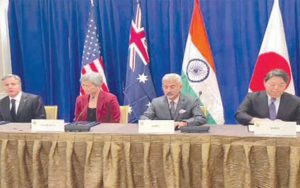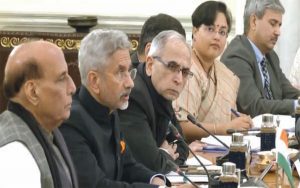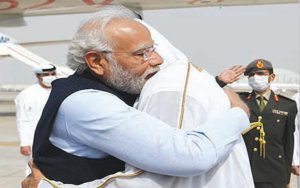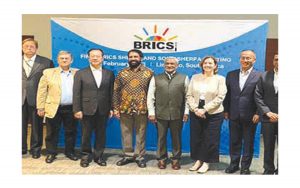Year 2023 | A pinnacle year for India’s foreign policy
New Delhi, Dec 30: In the landscape of ongoing global conflicts, like Israel-Gaza and Russia-Ukraine, which have contributed to economic downturns and humanitarian crises, India has demonstrated remarkable resilience and diplomatic finesse. Despite facing complex challenges, India has skillfully maintained a delicate balance that fostered not only its growth but also established neutral and harmonious relations with key nations involved in these conflicts with few exceptions.
In 2023, India became a big player in the world. India achieved a lot, like being the first country to land a spacecraft near the moon's South Pole in the Chandrayaan-3 mission. India also led the G-20 group for a year and strengthened its connections with several countries like the Global South, Oceanic Countries, and United States in areas like the economy, politics, space, and technology. All of this happened while the world was still getting better after dealing with the effects of Covid-19.
I was reading an article on the internet and my attention was diverted towards the question asked by a member of the parliament in the Rajya Sabha on 3 August 2023, as to whether there had been any special achievements of Indian foreign policy.
The MEA responded, “India’s foreign policy has chartered a path that enhances its strength, protects its core interests, and ensures India’s continued upward trajectory as a fast-growing and inclusive economy with a rising profile in global affairs.”
The international affairs experts recognize this juncture as a defining moment, positioning India as a substantial stabilizing force in a divided world. This recognition has elevated India's global image, portraying it as a soft power that conducts business with unprecedented influence and effectiveness.
The year 2023 has been a standout year for India in terms of its foreign policy achievements, resulting in a surge in global recognition. The recognition of the Indian Passport has experienced a significant leap. Despite facing various challenges, India's name resonates prominently among global leaders who wield influence in shaping the global agenda.
G20 and India
One of the key highlights of 2023 was India’s successful organization of the G20 Summit and hosting two editions of the Voice of Global South Summit, significantly enhancing India’s role as a facilitator for global cooperation and discussions on crucial international issues.

The G20 Summit, held from September 9 to 10, 2023, saw the adoption of the landmark New Delhi Leaders’ Declaration, a testament to India’s diplomatic prowess.
Despite initial concerns about achieving a joint declaration, especially regarding the Russia-Ukraine issue, India successfully navigated negotiations, bolstering its position for future challenges.
The inclusion of the African Union as a member of the G20 added further strength to India’s foreign policy and its growing global acceptance, marking a significant achievement in the country’s diplomatic endeavors.
India and the West Asia Countries
India's diplomatic ties with West Asia are on a trajectory of growth, persisting in an upward trend. Despite concerted efforts by Pakistan, backed by China, to isolate India from influential Muslim nations, the image of India as a growing economic power nation has solidified.
Some countries and opposition in India engulfed in the internal political landscape have projected the “Hindutva ideology” of the ruling government. Despite these developments, India's engagement with Muslim-majority nations remains robust.

The multifaceted nature of India's foreign policy allows it to maintain diplomatic relations with West Asian Muslim-majority countries that hold significance on the global stage. India's commitment to fostering cooperation, trade, and cultural exchanges with the Gulf countries demonstrates its diplomatic resilience and the ability to navigate complex geopolitical challenges.
While the internal dynamics within India contribute to the solidification of its political party image, the external diplomatic efforts counteract isolationist endeavours, ensuring that India remains an active and engaged participant in the global community.
India-Oman relations received a substantial boost with the maiden State Visit of Sultan Haitham bin Tarik to India on December 16. The ceremonial welcome at the President’s House in New Delhi marked a historic moment, as it was the Sultanate of Oman's Sultan's first visit to India in over 25 years. The visit culminated in the adoption of a Joint Vision document titled ‘A Partnership For the Future,' signifying a shared vision between the leadership of Oman and India. This document underscores the synergy between Oman Vision 2040 and India's development objectives, emphasizing a commitment to harnessing complementarities for deepening the partnership in diverse areas, including maritime cooperation, energy security, space technology, digital payments, trade, health, tourism, IT & innovation, and agriculture. The bilateral trade between India and Oman doubled from USD 5.4 billion in 2020-21 to USD 12.3 billion in 2022-23, reflecting the strengthening economic ties. With a Diaspora of over 700,000 Indians residing in Oman, the visit and developments underscore the positive trajectory and growing depth of the relationship between the two countries.
India -Saudi Arabia Relationship
The State visit of Prince Mohammed bin Salman bin Abdulaziz Al Saud, Crown Prince and Prime Minister of the Kingdom of Saudi Arabia, to India on September 11, 2023, marked a significant milestone in the strengthening of bilateral relations and strategic partnership between Saudi Arabia and India. The ceremonial welcome at the President’s House in New Delhi symbolized the warmth and importance of the diplomatic ties. The visit included the co-chairing of the inaugural meeting of the India-Saudi Strategic Partnership Council, a mechanism established in October 2019. The leaders reviewed the substantial progress particularly in the areas of political, security, social, and cultural cooperation, as well as economic and investment collaboration. The signing of various agreements during the visit, such as those in the fields of energy, digitization, and electronic manufacturing, underscored the commitment to fostering collaboration across diverse sectors.

Trade relations between India and Saudi Arabia have witnessed an upswing, surpassing US$ 52 billion in the fiscal year 2022-23, showcasing a substantial growth of over 23%. Acknowledging this economic momentum, both nations highlighted the significance of their bilateral trade partnership, with India being the second-largest trade partner for Saudi Arabia and reciprocally, Saudi Arabia ranking as the fourth-largest trade partner for India. Additionally, the two countries emphasized the importance of consistently endorsing each other's candidatures in various multilateral forums and international organizations.
On September 11, during the G20 summit, the United States, India, Saudi Arabia, and the United Arab Emirates jointly declared the initiation of a novel trade route that will link India to the Middle East and Europe via railways and ports. This ambitious endeavour, poised to usher in a new era, has encountered a setback amid the Israel-Gaza conflict. Nevertheless, if successfully implemented, it presents a direct challenge to China's Belt and Road Initiative—a multi-trillion-dollar infrastructure project initiated by Beijing a decade ago to establish global connectivity, thereby altering the geopolitical landscape and economic dynamics.
India-UAE
President of the United Arab Emirates Sheikh Mohamed bin Zayed Al Nahyan and Prime Minister of India Narendra Modi met in Abu Dhabi on 15 July 2023.
This was the fifth visit of Prime Minister Narendra Modi to the UAE in the last eight years. The UAE-India relations have witnessed progress on all fronts. India-UAE trade rose to USD 85 billion in 2022, making the UAE India’s third-largest trading partner for the year 2022-23 and India's second-largest export destination. In February 2022, India became the first country with which the UAE signed a Comprehensive Economic Partnership Agreement (CEPA). Bilateral trade has increased by approximately 15% since the entry into force of the CEPA on 1 May 2022. The signing of a Memorandum of Understanding in 2023 for planning to establish the Indian Institute of Technology – Delhi in Abu Dhabi is another achievement in the growing trust and relationship between the two countries.
India-Egypt
During the state visit of the Prime Minister to Egypt on June 24-25, 2023, several significant agreements, and memoranda of understanding (MoUs) were established between India and Egypt. The outcomes of the visit include the initiation of a Strategic Partnership Agreement between India and the Arab Republic of Egypt, fostering a deeper connection between the two nations. Additionally, collaborative efforts were formalized through MoUs, such as cooperation in Agriculture and Allied sectors between the Ministries of Agriculture of both countries and the Protection and Preservation of Monuments and Archaeological sites & remains between the Archaeological Survey of India and the Supreme Council of Antiquities of Egypt. In terms of announcements, a direct flight between Cairo and Delhi was revealed, promoting enhanced connectivity, and plans for establishing a Centre of Excellence of Information Technology at Dar Al Ifta in Cairo were set in motion, reflecting the commitment to technological collaboration between the two nations.
India’s role in increasing Voice of the Global South in 2023
Leaders from Global South countries met twice in 2023 with the initiative of New Delhi. India in November convened the second virtual 'Voice of the Global South Summit,' under the theme, 'Global South: Together for Everyone's Growth, Everyone's Trust.' Addressing the unprecedented challenges faced by these nations, including the COVID-19 pandemic, climate change impact, rising inflation, and food and energy insecurity exacerbated by geopolitical tensions leaders expressed a shared vision for a future where no one is left behind, addressing poverty eradication, concessional financing, and the achievement of Sustainable Development Goals (SDGs). The summit underscored the urgent need for reforming global governance structures to align with contemporary realities, especially catering to the needs of the Global South countries.
Acknowledging India's efforts in strengthening the Global South's voice, including the inclusion of the African Union as a permanent member of the G20, leaders outlined key areas for collective global action to realize an inclusive, peaceful, and prosperous future. The State Visit of the President of the Republic of Kenya, Hon. William Samoei Ruto, to India from December 4 to 6, 2023, was the outcome of the participation in the Voice of Global South where both nations reaffirmed their commitment to strengthening bilateral ties. President Ruto highlighted Kenya's active participation in the Voice of Global South Summit hosted by India in January and November 2023. India pledged a new Line of Credit (LOC) amounting to USD 250 million for Agricultural Mechanization Projects in alignment with Kenya's national development priorities.
India -US
In 2023, the relationship between India and the U.S. reached new heights, particularly highlighted during the fifth India-U.S. 2+2 Ministerial Dialogue in New Delhi.
Defence Minister Rajnath Singh and External Affairs Minister Dr S Jaishankar met Secretary of US State M. Antony J. Blinken and Secretary of Defence Lloyd J. Austin III. The ministers stressed the significance of the ever-increasing India-U.S. Comprehensive Global Strategic Partnership, especially in fostering international peace and security, through initiatives like the Quad in the Indo-Pacific region. Both nations expressed deep concern about the conflict in Ukraine, highlighting its humanitarian consequences and the impact on the global economic system. Both countries committed to enhancing collaboration through dialogues, military exercises, and joint projects. The highlight of the year between India-US negotiations commenced for a commercial agreement between General Electric Aerospace and Hindustan Aeronautics Limited (HAL) to manufacture GE F-414 jet engines in India.
On counter-terrorism b, both countries condemned terrorism and violent extremism. They emphasized the importance of upholding international standards on anti-money laundering and combating the financing of terrorism.
However, post the G20 summit, the relationship faced a challenge due to suspicions from the Five Eyes countries regarding Indian agents' alleged involvement in the death of a separatist activist in Canada and an attempted incident in the U.S. that India vehemently denied. The unfolding legal process against arrested Nikhil Gupta, the alleged mastermind, could pose challenges in 2024. Despite the robust relationship, India recognizes the U.S.'s tendency to leverage issues like religious freedom and human rights. Navigating these concerns and interactions with the U.S. and its Western allies will require strategic manoeuvring in 2024.
India- Russia
In December 2023, External Affairs Minister Dr S Jaishankar undertook a visit to Russia, lasting from the 25th to the 29th. During his time in Moscow, Dr Jaishankar met with President Vladimir Putin and engaged in discussions with Deputy Prime Minister and Minister of Industry and Trade Denis Manturov, as well as Minister of Foreign Affairs Sergey Lavrov.
The discussions covered a broad spectrum of topics, including bilateral cooperation in trade and economic affairs, energy, defence, connectivity, cultural exchanges, and people-to-people interactions.
The relationship between India and Russia remains strong and intimate despite Russia and China presently being the closest ally. India also has remained quite neutral in the Ukraine and Russia conflict and continues to buy raw petroleum products from Russia, despite sanctions on the country from the US and its Western allies. India’s cooperation with Russia was further strengthened with several significant documents signed during the visit, including agreements related to the Kudankulam Nuclear Power Plants.
The visit provided an opportunity to review ongoing bilateral cooperation and explore avenues to further strengthen the Special and Privileged Strategic Partnership between India and Russia. The robust and steady India-Russia relations continue to build upon strategic convergences, shared geopolitical interests, and mutually beneficial cooperation.
India -Australia
In November 2023, India and Australia conducted their second India-Australia 2+2 Foreign and Defence Ministerial Dialogue in New Delhi. Minister of Defence Rajnath Singh and Minister of External Affairs Dr S. Jaishankar engaged with their Australian counterparts, Deputy Prime Minister and Minister for Defence, Richard Marles MP, and Minister for Foreign Affairs, Senator Penny Wong. This dialogue was part of the broader India-Australia Comprehensive Strategic Partnership (CSP), fostering mutual benefits and contributing to regional security and prosperity.
The dialogue followed the first India-Australia Annual Summit in March 2023, reaffirmed during engagements in Sydney in May 2023. Both nations committed to continuing effective collaboration through diplomacy, defence, and development activities.
Australia's role in Indo-Pacific, Middle East, and Ukraine security issues is important. Both countries are sharing coastlines in the Indian Ocean and both are partners in QUAD. The ministers recommitted to empowering the Quad, focusing on regional and global well-being. Progress made at the QUAD Leaders' Summit in Hiroshima in May 2023 was welcomed, and India looks forward to hosting the summit in 2024. India is also hosting the 2024 Antarctic Treaty System Meeting. defence, security, and maritime domain awareness collaboration have seen significant progress through joint exercises, dialogues, and consultative mechanisms. First-time hosting of Exercise Malabar by Australia and the maiden visit of the Indian Navy Submarine INS Vagir to Australia was significant in 2023. Australia plans participation in India's Exercise Tarang Shakti in 2024 and India's involvement in Australia's Exercise Talisman Sabre 2025. The two countries share maritime information sharing and maritime domain awareness, noting their collaboration in the Information Fusion Centre – Indian Ocean Region.
QUAD
During the 78th United Nations General Assembly in 2023, the Quad Foreign Ministers' Meeting saw the reaffirmation of commitment by the United States Secretary of State and the Foreign Ministers of Australia, India, and Japan to the principles of the United Nations. Emphasis was placed on upholding mutually agreed rules, norms, and standards. The QUAD, consisting of these nations, strongly reiterated its support for a free and open Indo-Pacific, pledging to advance a vision articulated in Hiroshima on May 20, 2023. This vision aspires to create a peaceful, prosperous, stable, and secure region, devoid of intimidation and coercion, with disputes resolved following international law while opposing any unilateral attempts to alter the status quo. The commitment to the UN Charter and its purposes and principles was underscored, with a call for refraining from the threat or use of force against the territorial integrity or political independence of any state.
Further, the Quad expressed support for ASEAN's unity and centrality, endorsing the ASEAN-led regional architecture and practical implementation of the ASEAN Outlook on the Indo-Pacific. The Quad highlighted cooperation in the Indian Ocean region, support for Pacific Island countries, and the strengthening of ties with regional organizations.
Additionally, the Quad stressed the importance of countering terrorism, including the use of emerging technologies for terrorist purposes, and committed to a comprehensive and balanced approach to curb terrorist activities through collective international efforts.
BRICS
In 2023, India actively participated in and demonstrated a strong commitment to the principles of multilateralism, international law, and the United Nations Charter within the context of its relationship with BRICS (Brazil, Russia, India, China, and South Africa. A significant development occurred during the XV BRICS Summit, where guiding principles for the BRICS expansion process were established. The decision to invite new members, including Argentina, Egypt, Ethiopia, Iran, Saudi Arabia, and the United Arab Emirates, as full members from January 1, 2024, reflected BRICS's commitment to broadening engagement. The BRICS-Africa Outreach and BRICS Plus Dialogue demonstrated a commitment to engaging with a broader spectrum of nations.

Russia takes over the chairship from South Africa in 2024 on the theme of "Strengthening of multilateralism for just global development and security." The XVI BRICS Summit in Kazan, Russia, is anticipated with expectations for continued collaboration and consensus-building.
In summary, India's engagement with BRICS in 2023 demonstrates a commitment to inclusive multilateralism, an eagerness for partnership expansion, and an optimistic outlook for collaborative efforts under Russia's chairship in 2024.
India - China relationship
In 2023, India-China relations continue to persist in a strained state, marked by a lack of resolution and persistent tensions. Despite two high-profile informal summits between Prime Minister Narendra Modi and Chinese President Xi Jinping, in 2023, the relationship remains frozen. The genesis of the strain dates to the 2020 border clash in Ladakh, initiated by the deployment of People's Liberation Army troops, resulting in a fatal clash at Galwan Valley and casualties on both sides. Beijing's resistance to withdrawing additional troops deployed since the border clash has hindered progress, leaving bilateral ties stagnant. External Affairs Minister S Jaishankar highlights China's violation of agreements by deploying tens of thousands of soldiers in Ladakh.
Despite holding talks at various levels, there is a lack of forward movement, and India's strategic patience is maintained. Even though some disengagement has occurred at certain friction points, challenges persist at the Line of Actual Control (LAC). Deadlocks in the Depsang and Demchok areas further contribute to the lack of normalcy in relations.
China's perception of India is increasingly influenced by its strategic rivalry with the US, suspecting India's alignment with the US-led Indo-Pacific strategy meant to contain China. The absence of President Xi at the G20 summit in New Delhi and the prolonged vacancy of the Chinese Ambassador post in New Delhi signal diplomatic challenges.
Despite these tensions, bilateral trade between India and China has surged, surpassing USD 125 billion in 2023. However, this economic cooperation coexists with the broader geopolitical strains, indicating a complex relationship where economic ties thrive amid unresolved strategic issues.
India and South Asia
In 2023, India's regional dynamics with South Asian countries, including Afghanistan, Pakistan, Sri Lanka, Nepal, and others, are marked by economic challenges and internal political disturbances of respective countries. While India's narrative is one of growth, its neighbours grapple with various issues.
In the Maldives, the outcome of the presidential elections in September saw Mohamed Muizzu's victory, aligned with the "India Out" movement and Pro-China led by former President Abdulla Yameen Abdul Gayoom. This movement criticized perceived subservience to India, adding complexity to the political landscape in the Maldives -India relations.
Bhutan, during its National Assembly elections, is witnessing increasing interest from China in enhancing bilateral relations. The upcoming runoff between the People's Democratic Party (PDP) and the Bhutan Tendrel Party (BTP) in January 2024 adds an element of anticipation to the regional scenario. India keeps on watching the political narrative of Bhutan very closely.
Bhutan's King, His Majesty Jigme Khesar Namgyel Wangchuck, visited India officially from November 3 to November 10, 2023, accompanied by senior officials. The visit was just after the political ruling party had said in an interview that the border settlements between China and Bhutan including Dokhlam were in sight when the solution needed to have an Indian participation for their strategic border location.
During the visit, discussions between His Majesty and the Indian Prime Minister encompassed a wide range of topics, including bilateral cooperation, regional affairs, and global issues of shared interest.
Bangladesh's general elections scheduled for January 2024 are under scrutiny, with allegations against Prime Minister Sheikh Hasina and the Awami League for suppressing the opposition Bangladesh National Party (BNP). Tensions persist due to the government's refusal to reinstate the caretaker government system.
Nepal continues to have an unstable government and sporadic protests amidst China’s interest in increasing its Belt and Road projects. Though relations between India and Nepal are better but still mistrust persists. Sri Lanka continues to fight its economic rebuild battle and may take some more time before political and economic stability returns.
In such a scenario, India, cognizant of its neighbourhood, faces concerns about terrorism emanating from countries like Pakistan, Bangladesh or Myanmar. Pakistan in itself is experiencing heightened troubles with terrorism in 2023, exacerbated by the Afghan Taliban's rise to power in Afghanistan and the breakdown of a ceasefire with the Tehreek-e-Taliban Pakistan (TTP). The eviction of over 1.7 million undocumented Afghan migrants by Pakistan led to a humanitarian crisis and strained relations with Kabul. India keenly continues watching the deteriorating and disturbing situation in the neighbourhood and not to talk of Myanmar violence which again is posing a threat on the borders with the North East States.
India -Afghanistan
India has called on the Taliban to honour their commitment to preventing the use of Afghan territory for threats to any country's security, citing UNSC Resolution 2593 (2021). The resolution emphasizes that Afghan territory should not be utilized for planning or financing terrorist attacks, sheltering terrorists, or posing threats to any nation. Additionally, Indian ministers urged the Taliban to uphold the human rights of all Afghans, including women, children, and minority groups, ensuring freedom of travel. India in 2023 is running a passive embassy in Kabul.
Looking ahead, India's general elections in 2024, likely between April and May, indicate favourable prospects for Prime Minister Modi and the Bharatiya Janata Party (BJP). Modi's international standing has grown, and the election outcome could reshape global influence, raising concerns for China, which shares disputed borders with India and sits across the Himalayas.
As we navigate this dynamic landscape, the strategic alliances between India, West Asia, the United States, and Russia stand out prominently. A potential victory for Modi in 2024 can reshape the global order significantly. Against the backdrop of evolving alliances and emerging challenges, the geopolitical dynamics in the region continue to unfold. As we bid farewell to a busy and prosperous 2023, the prospect of an intriguing and eventful 2024 awaits.